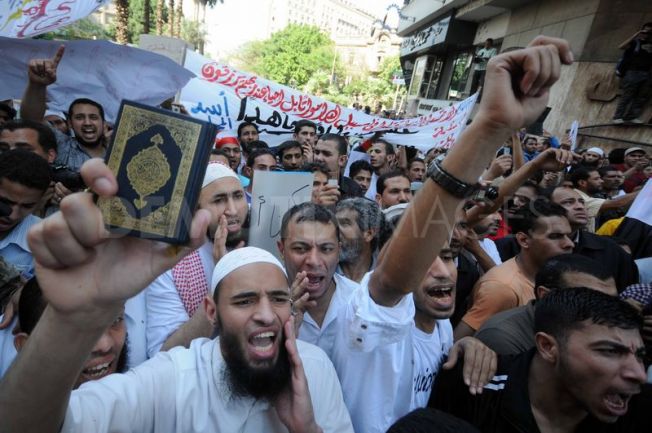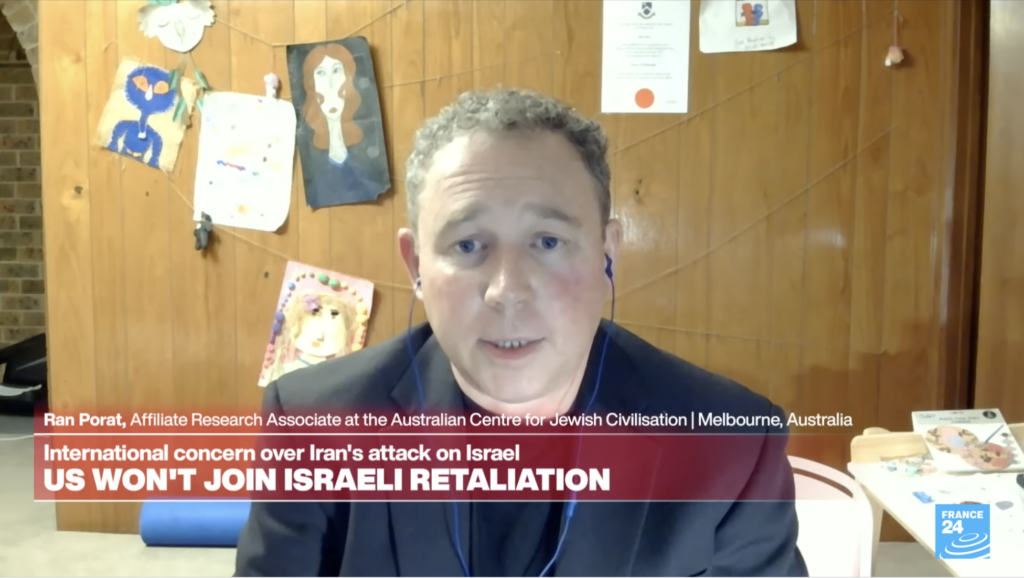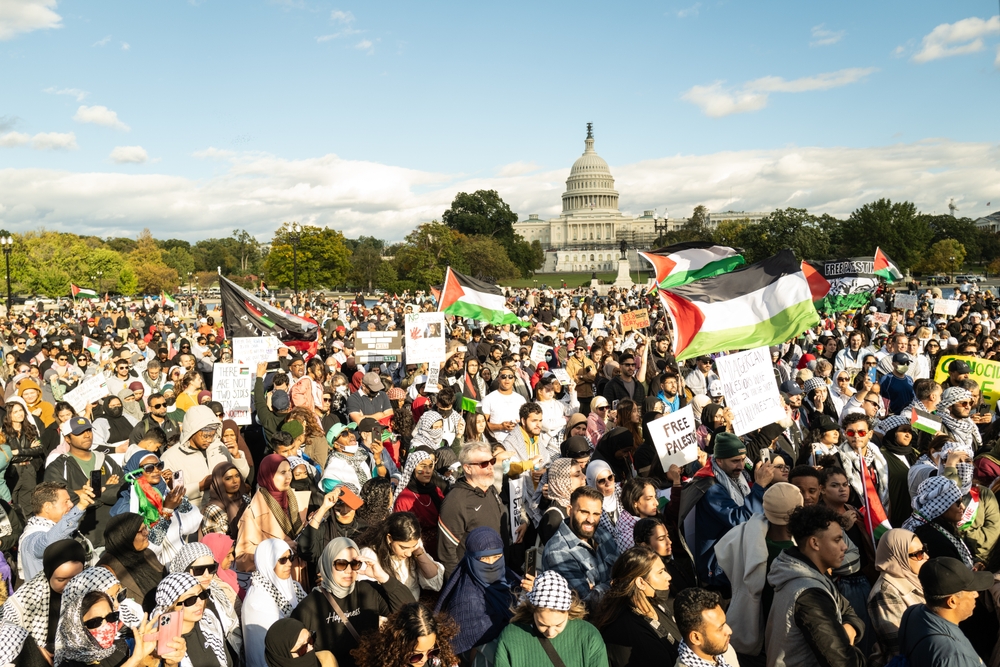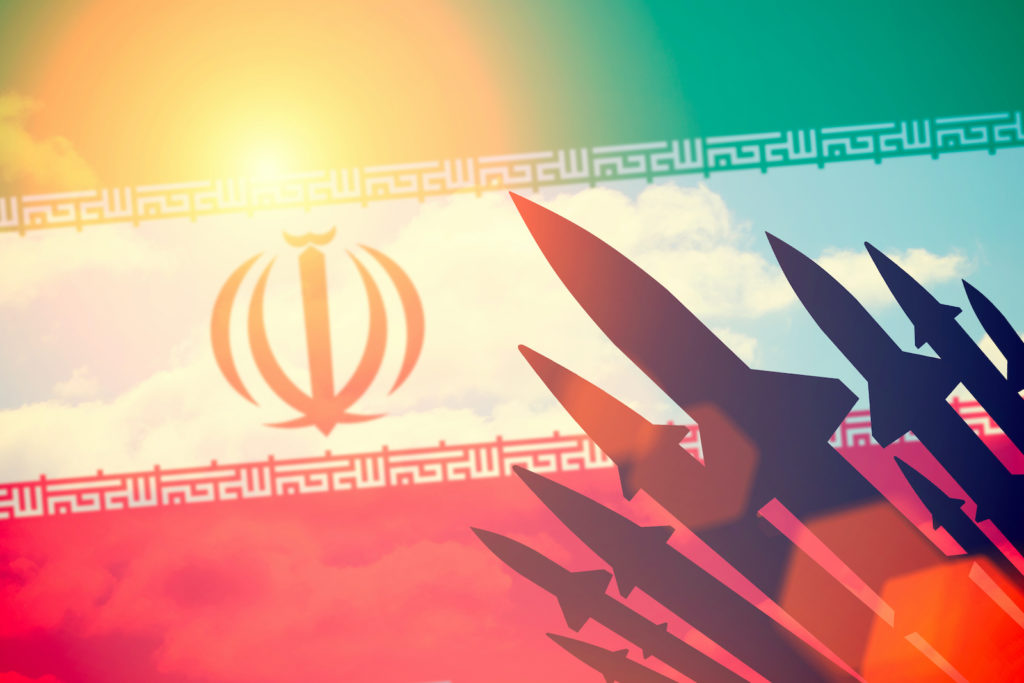UPDATES
Egypt’s Salafists/ The Forgotten Refugees
Dec 8, 2011

Update from AIJAC
December 8, 2011
Number 12/11 #02
This Update features two pieces on one of the unpleasant surprises to come out of the first round of the Egyptian elections last week, the unexpectedly strong showing of the hyper-Islamist Al-Nour Salafist parties, who got 24.4% of the vote, second behind the also Islamist Muslim Brotherhood with 36%. Both reports are from analysts currently on the ground in Cairo.
Washington Institute scholar Eric Trager describes his own encounters with Salafist candidates and activists, as well as locals who support them. He finds them viewed by locals as honest, even saintly, despite the fact that they seem to have considerable inexplicable money for their campaign and it is unclear where this came from. He captures their extremism in an interview with one leader on the treaty with Israel, in which he insists he doesn’t want war with Israel, but then explains that the way to prevent it is for Israel to “leave the part that it took from me” which it turns out is “all of Palestine – not just the West Bank or Gaza.” For the rest of Trager’s enlightening report, CLICK HERE. Meanwhile, Barry Rubin looks at how Egyptian liberals are essentially now admitting they have lost, and earlier, he explained why Westerners tend to consistently underestimate the appeal of Islamist radicals in Middle Eastern elections.
Next up is Ed Hussein of the US Council on Foreign Relations, himself a former Muslim radical in Britain, also reporting from Egypt. He notes that there is a tendency on the part of many in the West to treat the Salafists as harmless religious traditionalists like the Amish, and argues in detail that their beliefs make this a mistake. He points to three such beliefs – anti-democratic beliefs in sovereignty of God, a religiously mandated hatred of non-Muslims, and Takfir, the practice of declaring other Muslims as no longer Muslims, and thus targets for murder, because of their differing religious views. For this analysis of their worldview from a former insider, CLICK HERE.
Finally, former Canadian Attorney-General and current MP Irwin Cotler takes on the refusal of the international community to address the plight of the Jewish refugees from the 1948 war. He calls attention to a recent report documenting their history and case for some redress for what he says were activities in the Arab world not dissimilar to the pogroms of Europe. Finally, he offers a 9 point plan to put the issue on the agenda, arguing that continuing to ignore it “will only prejudice authentic negotiations between the parties and undermine the justice and legitimacy of any agreement.” For all that the has to say, CLICK HERE.
Readers may also be interested in:
- Israeli military expert Giora Eiland discussing the dangers to Israel from an Islamist Egypt.
- An analysis of the latest Fatah-Hamas agreement from Israeli General turned analyst Shlomo Brom. Plus, is the US inadvertently subsidising Hamas?
- Syrian dictator Bashar Al-Assad insists he hasn’t ordered a crackdown on protests despite the 4000 dead in his country – analysis of his bizarre claims comes from former journalist in Syria Andrew Tabler.
- Israeli expert Galia Lindenstrauss looks at the growing confrontation between Syria and Turkey, and the possibility that a “buffer zone” will be set up along the border.
- A look at what is next for Yemen now that President Saleh has agreed to step down.
- Some examples from the many stories and comments now appearing at AIJAC’s daily “Fresh AIR” blog:
- A “Fisking” of a piece on Iran by Australian strategic analyst Hugh White and a post debunking a misleading piece on West Bank Bedouin published in the Fairfax papers.
- A look at the latest round of efforts to impose tougher sanctions on Iran, including by Australia.
- A post on the antisemitism now increasingly becoming a part of the Arab Spring. Plus, another on a baseless effort to insist Arab antisemitism isn’t “real” but is only a response to Israeli policies.
- A Fatah official insists Fatah joins Hamas in rejecting Israel’s right to exist.
- Colin Rubenstein on Israel and Australia’s Asian neighbours.
Thought the Muslim Brotherhood Was Bad? Meet Egypt’s Other Islamist Party
By Eric Trager
New Republic, December 2, 2011
The big story from Egypt’s parliamentary elections, the first round of which concluded on Tuesday, will likely be the Muslim Brotherhood’s impressive victory. But the Brotherhood’s anticipated rise from outlawed organization to parliamentary power won’t be surprising: the Brotherhood’s strong mobilizing capabilities are well known, and Hosni Mubarak often warned the West that its choice was between his autocracy or the Brotherhood’s theocracy.
The real surprise is the emergence of the Salafist Nour party, a deeply theocratic organization that bases its ideology on a literal reading of the Qur’an and Sunna and, most astoundingly, didn’t exist until a few months ago. Although Salafist political activity was, unlike the Brotherhood, completely banned under the Mubarak regime, the Nour Party is giving the Brotherhood a run for its money in some districts. Not only is the Islamist Alliance, in which the Nour Party is the major player, running 693 candidates — but those candidates’ banners and images have been ubiquitous, even in Egypt’s least religious neighborhoods. It is now expected to place second when the final round of elections is completed in January, perhaps winning as much as 30 percent of the vote.
The Nour Party’s strong campaign was particularly noticeable here in Fayoum, a rural governorate 81 miles southwest of Cairo that is home to 2.5 million people. Based on my experiences covering various Cairo polling places on Monday, I fully expected a strong showing in Fayoum for the Muslim Brotherhood, whose Islamist ideology is very much at home in this traditional countryside region. And, indeed, the Brotherhood was quite visible. But the Nour Party was, without question, much more visible. From the moment we entered the governorate, Nour banners — and often only Nour banners — were everywhere: atop light poles, along traffic islands, and even on mosques. (One aspect of the Nour’s campaign particularly impressed me: To get around the ban on using the Islamic crescent as a party symbol, Nour chose to be represented on ballots by another Islamic symbol: the fanous, a decorative lamp that Muslims display during Ramadan.)
My first stop was at a polling station along a major road, a schoolhouse that was one of the few structures in an otherwise pastoral setting. Although there was little foot traffic, approximately two dozen enthusiastic Nour party supporters — again, only Nour party supporters — were milling about, apparently waiting to help voters. “I voted for the Nour party yesterday,” Ahmed Kamel, sporting the bushy-beard-sans-mustache look that is typical of Salafists, told me. “They are honest and I trust them a lot. They depend on the Holy Qur’an and the Sunna of the Prophet Muhammad, Peace Be Upon Him.”
At my second stop, a very busy polling station towards the center of Fayoum city, the Nour Party and Muslim Brotherhood’s Freedom and Justice — and no other parties — manned nearby voter assistance kiosks. But here, the Nour Party’s presence was notably more advanced: whereas the Brotherhood was using an old desktop with a boxy monitor to tell people which voting box was theirs, the Nour activists were working off of two sleek, new-looking laptops and handing out impressively concise copies of their platform.
Yet the most impressive scene came at my third stop, in front of the Nour Party’s Fayoum headquarters, where I found a number of activists clad in yellow, Nour-emblazoned, reflective vests. They had been collecting voters from centralized locations and bringing them to the polling places all day. “We announce where [voters] should meet,” Mohamed Abdel Rahman Mahmoud, a 32-year-old electrician, told me. “We have a microphone on our cars, and we move around to tell them.” The Nour Party’s voter-roundup operation was hardly unique to Fayoum: a colleague of mine also spotted yellow-vested Salafists in the city of Luxor, and it is likely that they used this technique in similarly traditional settings where they have wide support.
When I asked these bushy-bearded politicos how they had emerged from obscurity to omnipresence in a matter of months, they insisted that the Nour Party had organically grown from the bottom-up. “As Salafists, we are part of the Muslim community and we connect with Muslims as brothers, and there is a private connection as Salafists,” Mohamed Abdel Tawaq, the Nour Party’s 31-year-old Fayoum coordinator, told me. “We met each other through mosques and universities. We live in a Muslim society.”
But the mass organization that they’d pulled off so quickly clearly requires money. Where is it coming from? “We pay zakat to an organization that belongs to the party,” said Abdel Tawaq. Rumor has it, I replied, that most of their funds come from Saudi Arabia, which — I didn’t say this part aloud — has a history of exporting its own Islamic radicalism elsewhere. “You see all the [Nour Party] branches around Egypt, and you think we have so much money,” said Ali Sharaf, a Nour party coordinator who was sitting nearby. “But we’re really struggling to pay the rent here. Our money comes from dues.” He said that dues were only 10 Egyptian pounds — roughly $1.75 — each month, and that they had registered thousands of new members. (Given the ubiquity of the Nour Party’s banners and the scale of their operation, this is scarcely believable.)
I also asked the Salafists why hadn’t they just joined the Muslim Brotherhood. “Because the Muslim Brotherhood is a group and tied to certain rules,” said Ali Sharaf, a Nour party coordinator who was sitting nearby. “But I’m a Muslim and Islam is open to anything.”
Yet I’d already learned that the Salafists were not as open-minded as they claimed. At one of my polling place visits, a van full of women that had been brought to vote for Nour called me over to extol the Nour Party’s virtues. “They are good people and serve the community,” said Nour al-Hoda Desouki, excitedly holding a Nour party sample ballot. “We are a conservative people but we’ll talk to you.” But her good deed couldn’t go unpunished. A Nour representative swiftly approached my translator and told us to stop talking to women.
Still, I humored the Salafists. If they were truly “open to anything,” would they support allowing Egyptian hotels to continue serving alcohol to tourists? “In my opinion, no,” said Mehdi, the Nour activist handing out party programs by the polling station. “Because it’s forbidden.”
“But the people who drink aren’t Muslims,” my translator, himself a committed Muslim, interjected.
“They have to respect the country,” Mehdi replied. “Like in Germany, people respect the country and have to speak German. You have to respect the country you’re in, even if you disagree.”
Well, what would be your policy towards Christians? Would you force them to pay the jizya — the special tax that Muslim rulers historically imposed on non-Muslim minorities to pay for Islamic wars? “They already pay it through their taxes,” Sherif, another local Nour coordinator, said. “Each society has its own revenue sources — in Islam, it’s zakat for Muslims and jizya for non-Muslims. Even they have to serve in the community, whether they’re Christians or Jews. They pay jizya because we offer security.”
Finally, I turned to foreign policy. What is your view of Camp David, I asked. “I heard about Camp David when I was a kid and I heard from people and our scholars that it is unjust for us,” Sherif said. “But I never read it.” (This Islamist apparently subscribed to the Herman Cain school of international relations.) “I don’t want war with Israel,” he continued. “So Israel must leave the part that it took from me.” Which part? “Israel should withdraw from all of Palestine — not just the West Bank or Gaza.” I gave him a confused look. “I never denied that some Jews lived there before.” On that note, I said goodbye.
As we headed back to the cab, our driver — who had sat in for that last part — nodded approvingly. “They’re really good people,” he said. Though he’s not an Islamist himself, he had voted for Nour earlier in the week. Why? “They’re honest.”
Eric Trager, The Washington Institute’s Ira Weiner fellow, is a doctoral candidate in political science at the University of Pennsylvania, where he is writing his dissertation on Egyptian opposition parties.
Back to Top
————————————————————————
Why Egypt’s Salafis Are Not the Amish
by Ed Husain
Council on Foreign Relations, Posted on Thursday, December 1, 2011
Here on the streets of Cairo, I sense a new pride today among Egyptian Salafis. Reports of their electoral success in the first round of Egypt’s parliamentary elections have injected them with confidence in their religious agenda and struck fear in the hearts of millions of Egyptians. Those who denied that Egypt had a problem with Muslim radicalism were sharply awoken from their sleep.
Now, while many in Egypt are terrified at the prospect of Salafis in parliament, left-leaning policymakers in Washington, DC, will be arguing that Salafis are harmless, pious, and orthodox Muslims. Wrong.
Most Salafis aim to emulate the “first century” of Islam, the first three generations of Muslims (as understood by Salafi literature published in Saudi Arabia). This emphasis on the “first century,” and scriptural literalism—wearing long beards without mustaches, donning short robes, practicing social separatism, and mandating a “homemaker” role for women may—seems similar to the attitudes of Christian Amish communities in the United States. This spin is useful for several officials at the U.S. and British embassies in Riyadh—but betrays the reality of the threat posed by extreme Salafism.
First, Osama bin Laden, Ayman al-Zawahiri and every other major Islamist terrorist came directly from the Salafist or Wahhabi school of the thought. They are motivated by a Salafi creedal concept named hakimiyyah, the idea that God is ruler and sovereign over man, the ultimate source of government. Jihadis and al-Qaeda wish to create this hakimiyyah, or caliphate, by force in the form of violent jihad. Egypt’s Salafis are trying to create the caliphate via the ballot box, while the Muslim Brotherhood is trying to tone down the “Islamic state” aspect, emphasizing the civil state. Almost all Salafis wish to adopt their understanding of sharia as state law, or tatbiq al-sharia about which I have written here and here and here. Some Salafis will moderate their views as they interact with the real world in pursuit of the “Islamic state,” some will persist, others will become disenchanted and walk the path of jihad.
Second, while extreme Salafis advocate hakimiyyah, almost all Salafis believe and constantly remind each other of the need to be loyal only to Muslims, and to hate, be suspicious of, not work in alliance with, and ensure only minimal/necessary interaction with non-Muslims. This attitude is underpinned by the Salafi creedal belief in al-wala wa al-bara, broadly translated as fidelity to Muslims and hatred for non-Muslims. Ayman al-Zawahiri wrote extensively about al-wala wa al-bara and speaks about it often in his video messages.
Third, combined with dogged beliefs about the caliphate and the disavowal of non-Muslims comes the Salafi tendency to engage in takfeer, the excommunication of other Muslims. Once a Muslim has been labeled a kafir then Salafis may justify violence against the newly declared apostate. These are not abstract ideas. Takfeer was used to kill Anwar al-Sadat, and Salafi extremists have used takfeer to justify killings in Algeria, Saudi Arabia, Egypt, and elsewhere.
As Egypt’s election results unfold in the coming weeks, it would be naive to write off the rise of Salafis as Egypt’s Amish. The above three ideas of literalist sharia as state law (hakimiyyah), manifest hatred of non-Muslims (al-wala wa al-bara), and excommunicating Muslims (takfeer), when underwritten by jihad, leads to violent extremism. Without jihad, it is plain and simple non-violent extremism. Either way, the rise of Islamist radicalism in the short term in Egypt is now a fact. In due course, I will write about ways in which this can be countered within a human rights framework, and without depriving Salafis of their legitimate success at the ballot box. Democracy can be bitter.
Back to Top
————————————————————————
Revisionism, rejectionism and Arab-Israeli peace
By IRWIN COTLER
Jerusalem Post, 12/07/2011 22:44
While serving as a Canadian delegate to the annual inter-parliamentary hearing at the United Nations, I came across an exhibit marking the annual International Day of Solidarity with the Palestinian People. The central theme of the exhibit is the Nakba – catastrophe – suffered by the Palestinian people, due to the establishment of the State of Israel.
Once again, the United Nations commemorated the International Day of Solidarity with the Palestinian People on November 29 – the 64th anniversary of the Partition Resolution – by continuing to ignore the plight of Jewish refugees. Turning history and law on its head, the world body once again failed to note that the Arab countries not only rejected a Palestinian state and went to war to extinguish the nascent Jewish state, but also targeted the Jewish nationals living in their respective countries.
Two refugee populations were created by that decision – the Palestinian refugee population resulting from the Arab war against Israel, and the Jewish refugees resulting from the Arab war against its own Jewish nationals.
Indeed, evidence contained in a report titled “Jewish Refugees from Arab Countries: The Case for Rights And Redress” documents a pattern of state-sanctioned repression and persecution in Arab countries – including Nuremberg-like laws – that targeted its Jewish populations, resulting in denationalization, forced expulsions, illegal sequestration of property, arbitrary arrest and detention, torture and murder – namely, anti-Jewish pogroms.
And while the internal Jewish narrative has often referred to pogroms as European attacks on their Jewish nationals, it has often ignored Arab-Muslim attacks on their Jewish nationals.
Moreover, as the report also documents, these massive human rights violations were not only the result of state-sanctioned patterns of oppression in each of the Arab countries, but they were reflective of a collusive blueprint, as embodied in the Draft Law of the Political Committee of the League of Arab States.
This is a story that needs to be heard. It is a truth that must now be acknowledged.
Regrettably, the United Nations also bears express and continuing responsibility for this distorted Middle East and peace narrative. Since 1948, there have been more than 150 UN resolutions that have specifically dealt with the Palestinian refugee plight. Yet not one of these resolutions makes any reference to, nor is there any expression of concern for, the plight of the 850,000 Jews displaced from Arab countries.
Nor have any of the Arab countries involved – or the Palestinian leadership involved – expressed any acknowledgement, let alone regret, for this pain and suffering, or for their respective responsibility for the pain and suffering.
How do we rectify this historical – and ongoing – injustice? What are the rights and remedies available under international human rights and humanitarian law? And what are the corresponding duties and obligations incumbent upon the United Nations, Arab countries and members of the international community?
To answer these questions, I propose a nine-point international human rights action agenda.
• First, it must be appreciated that while justice has long been delayed, it must no longer be denied. The time has come to rectify this historical injustice, and to restore the plight and truth of the “forgotten exodus” of Jews from Arab countries to the Middle East narrative from which they have been expunged and eclipsed these 64 years.
• Second, remedies for victim refugee groups – including rights of remembrance, truth, justice and redress, as mandated under human rights and humanitarian law – must now be invoked for Jews displaced from Arab countries.
• Third, in the manner of duties and responsibilities, each of the Arab countries – and the Arab League, which has played a protective role in Libyan and Syrian aggressions – must acknowledge their role and responsibility in their double aggression of launching an aggressive war against Israel and the perpetration of human rights violations against their respective Jewish nationals. The culture of impunity must end.
• Fourth, the Arab League Peace Plan of 2002 – still held out as a blueprint for an Arab-Israeli peace – should incorporate the question of Jewish refugees from Arab countries as part of its narrative for an Israeli-Arab peace, just as the Israeli narrative now incorporates the issue of Palestinian refugees in its vision of an Israeli-Arab peace.
• Fifth, on the international level, the UN General Assembly – whose theme in the session in which I participated this past week was “political accountability” – and in the interests of justice and equity – should include reference to Jewish refugees as well as Palestinian refugees in its annual resolutions; the UN Human Rights Council should address, as it has yet to do, the issue of Jewish as well as Palestinian refugees; UN agencies dealing with compensatory efforts for Palestinian refugees should also address Jewish refugees form Arab countries.
• Sixth, the annual November 29 commemoration by the United Nations of the International Day of Solidarity with the Palestinian People should finally be transformed into an International Day of Solidarity for a Two-Peoples Two-State Solution – as the initial 1947 Partition Resolution intended – including solidarity with all refugees created by the Israeli-Arab conflict.
• Seventh, jurisdiction over Palestinian refugees should be transferred from UNRWA to the United Nations High Commissioner for Refugees. There was no justification then – and still less today – for the establishment of a separate body to deal only with Palestinian refugees, particularly when that body is itself compromised by its incitement to hatred, as well as its revisionist teaching of the Middle East peace and justice narrative.
• Eighth, any bilateral Israeli-Palestinian negotiations – which one hopes will presage a just and lasting peace – should include Jewish refugees as well as Palestinian refugees in an inclusive joinder of discussion.
• Ninth, during any and all discussions on the Middle East by the Quartet and others, any explicit reference to Palestinian refugees should be paralleled by a reference to Jewish refugees from Arab countries.
The continuing exclusion and denial of rights and redress to Jewish refugees from Arab countries will only prejudice authentic negotiations between the parties and undermine the justice and legitimacy of any agreement.
Let there be no mistake about it. Where there is no remembrance, there is no truth; where there is no truth, there will be no justice; where there is no justice, there will be no reconciliation; and where there is no reconciliation, there will be no peace – which we all seek.
Tags: Egypt











